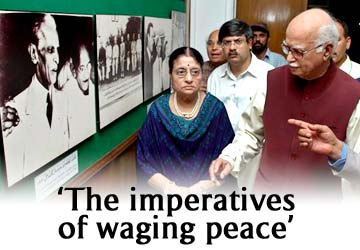Home > News > Specials
The Rediff Special
June 06, 2005

Previous: 'Time to undo the follies of Partition'
I dream of the day when divided hearts can be united; when divided families can be reunited; when pilgrims from one country -- Hindus, Muslims, Sikhs -- can freely go to holy sites located in the other country; and when people can travel and trade freely, while continuing to remain proud and loyal citizens of their respective countries.
Friends, if someone were to ask me to sum up the situation about Indo-Pak relations at present, I would, on the basis of what I have observed and experienced here since my arrival in Pakistan on the evening of May 30, say unequivocally that, 'Fiza zaroor badli hui hai, bahut badli hui hai.' (The atmosphere has definitely changed, it has changed a lot).
Yes, it's true that there is tranquility on the border, which is no mean achievement in itself. True, there are greater people-to-people contacts, which too is a significant step forward. It is also true that the awaam (people) of both India and Pakistan have taken over the peace process.
But the peace and tranquility that exists is still tentative. It is also relative, in the sense that terrorist acts in Jammu and Kashmir [Images] have not come to an end. Only last month there was a terrorist strike in Srinagar [Images] aimed at innocent school children.
Advani's missteps in Pakistan
How do we convert this tentative peace into permanent peace? How do we remove all the irrational abnormalities in our bilateral relations to place Indo-Pak ties on a completely normal footing based on the principle of mutual benefit?
I am posing these questions because these need to be discussed in-depth and with an open mind in both our countries. As I have reiterated on several occasions during my visit, I would like to emphasise that we need to seize this historic moment, which is pregnant with hope. We must convert this hope into confidence and resolve that we shall certainly find solutions to all the issues that have estranged our two brother-nations.
There should also be no going back on the realization that dialogue is the only way to resolve every single issue, including Jammu and Kashmir, between India and Pakistan. Peace cannot be achieved through recourse to non-peaceful means. This must be clearly understood.
Imperatives of Waging Peace
There is a phrase in English that has always intrigued me -- Waging Peace. Normally, one comes across the phrase -- Waging War. I have often wondered why the word 'wage' is used in the context of peace. It is probably because, if the resolve to win is the aim in any war, the same resolve to win has to be the aim of making peace.
However, there is a crucial difference. In war, strategists look for a quick victory. They have an impatience to achieve their goal. In waging peace, you cannot do that. We need patience. We need to realize that it takes time to minimize differences and to find a mutually acceptable solution, especially to longstanding problems.
Did Advani plot to kill Jinnah?
It takes time -- and I would urge all those who sincerely desire peace between India and Pakistan to realize this important truth -- because not only the painful manner in which Partition happened in 1947 but also subsequent hostilities have hardened feelings and rigidified mindsets in both India and Pakistan.
After all, Partition resulted not only in unprecedented violence but also in the largest cross-migration in the history of mankind. In history, including in the history of undivided India, kingdoms and dynasties have come and gone. Power has changed hands either peacefully or violently. But in recent centuries these developments did not destabilize the society very much.
In contrast, when the British left in 1947, not only was there a change of power, but there was also human displacement on a massive scale. This has left behind a trail of tragedy. The wars that followed, the long period of terrorist violence and other events have contributed to the hardening of positions in certain sections of society both in India and Pakistan.
This is the reason why even well-intentioned moves for peace and normalization are often viewed with suspicion and met with disapproval on both sides.
I therefore strongly submit to one and all involved in the Indo-Pak peace process -- to those in governments as well as to those in civil society organizations -- that we should give due weightage to these critical viewpoints. Nothing can be achieved by either dismissing or disparaging these critical viewpoints.
This is because, firstly, those who view the peace process with suspicion both here and in India are not insubstantial in number.
Secondly, in our endeavour to establish lasting peace between India and Pakistan, it is axiomatic that we should strive to carry with us all sections of society and public opinion in our two countries.
Next: 'Let us move in tandem'
AP PHOTO/Adnan Ali
Excerpted from BJP President & Leader of the Opposition L K Advani's speech at a function organised by the Karachi Council on Foreign Relations, Economic Affairs & Law, in Karachi, Pakistan, June 5